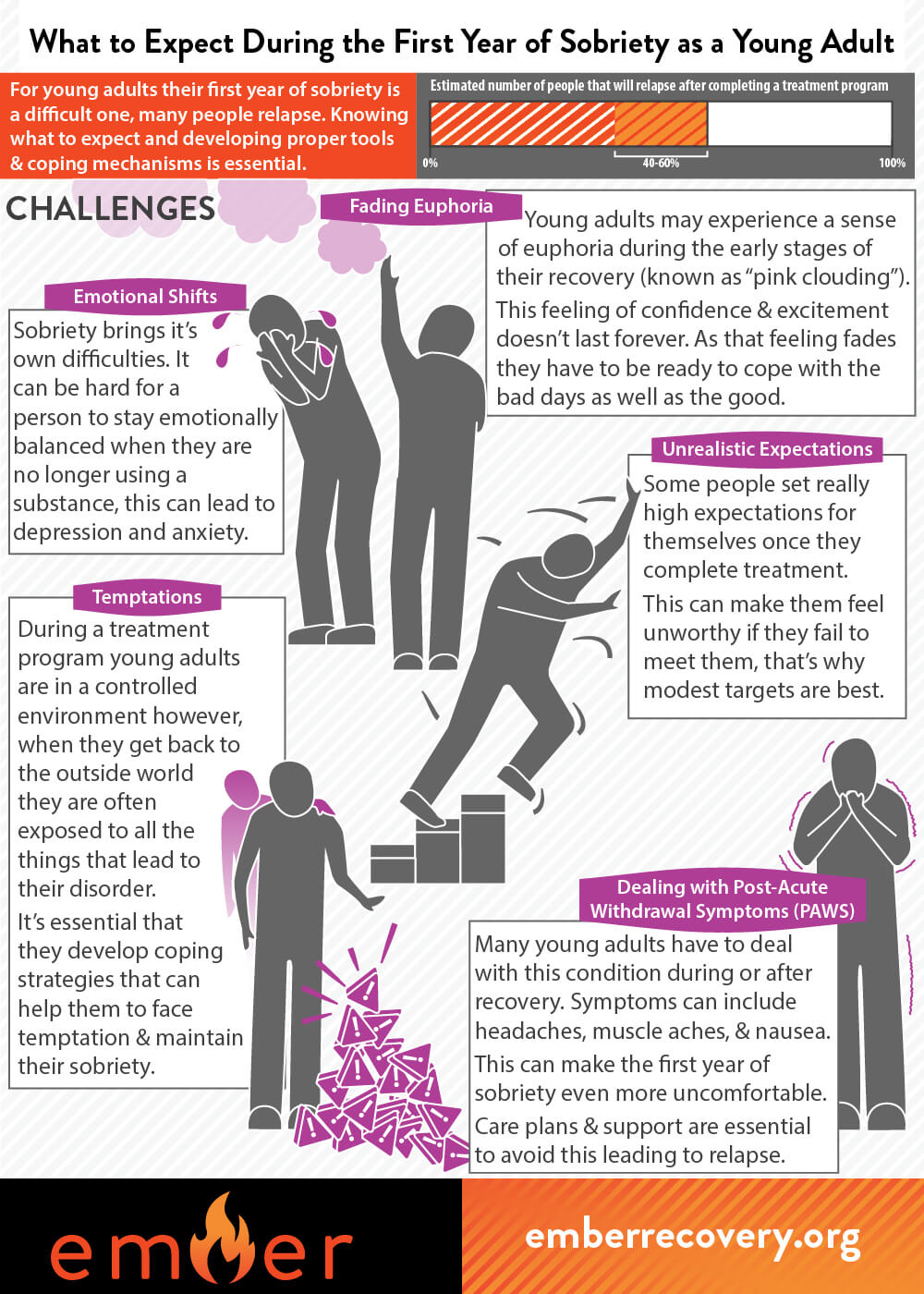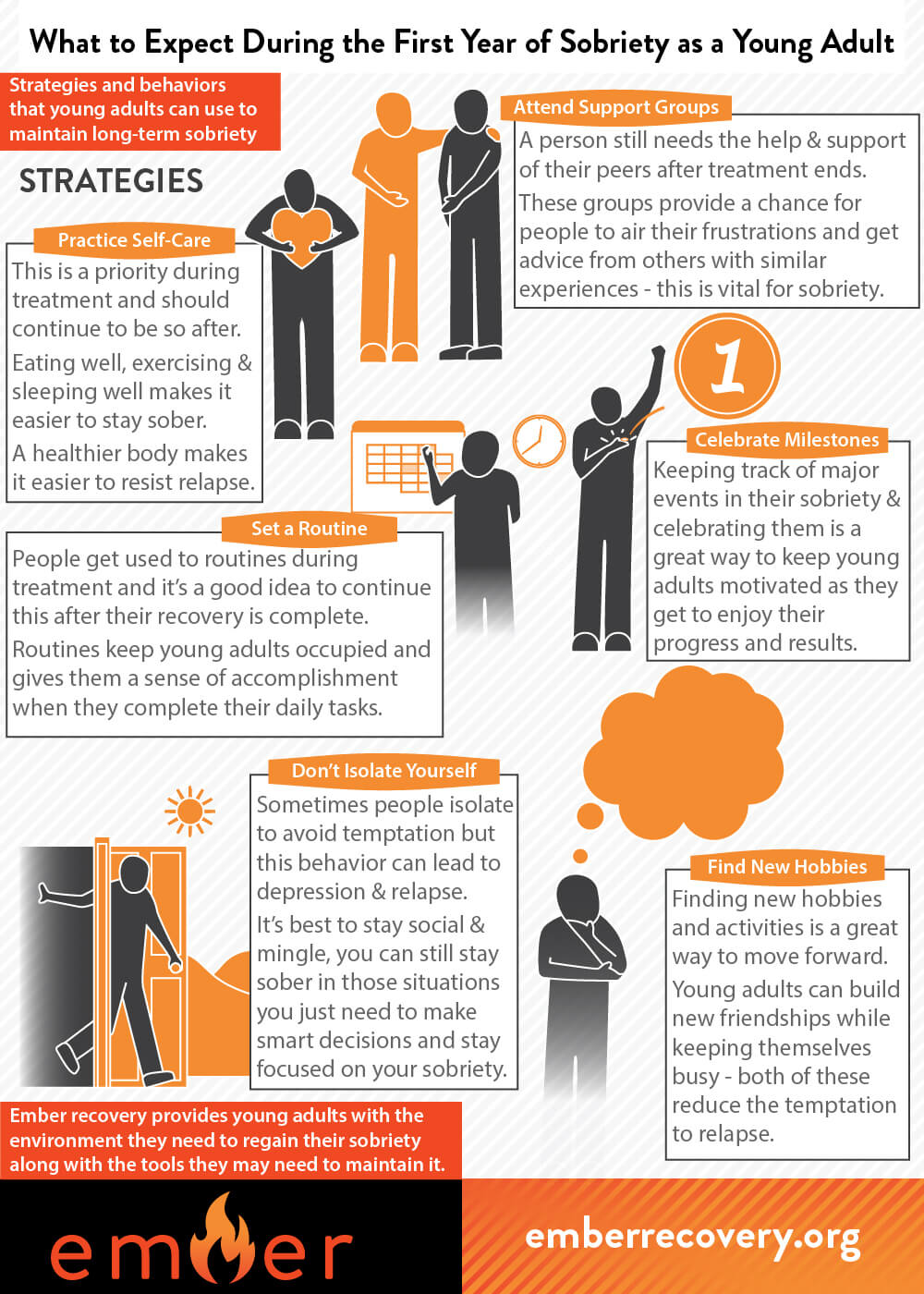It’s estimated that anywhere between 40 and 60 percent of those recovering from substance use disorders will relapse at some point after they’ve completed a treatment program.[1] For young adults, the first year of sobriety brings challenges as they figure out how to live without depending on a substance. But, with the proper tools and coping mechanisms, young adults can learn how to stay on their sober path.
Ember Recovery not only helps teens and young adults get sober but also prepares them for the reality of recovery and sobriety. Our team of experienced professionals has compiled this guide on what to expect during the first year of sobriety and tips on maintaining long-term sobriety.
Why is the First Year of Sobriety Hard for Young Adults?
Emotional Shifts
While maintaining sobriety has its own set of unique challenges, so does remaining sober. During the first year, you are adjusting to a new lifestyle, which can bring shifts in emotions. It can become difficult to find yourself without depending on a substance. This can lead to depression and anxiety, which is why it’s crucial to rely on healthy coping mechanisms such as exercise, journaling, and attending a support group. These can help you better manage shifts in emotions that can tempt sobriety.
Fading Euphoria
Many young adults who have reached sobriety may have experienced feelings of euphoria, which is often referred to as “pink clouding.” Pink clouding can occur during the early stage of recovery, leaving you feeling confident and excited.[2] But pink clouds don’t last forever, and neither do the feelings that can occur during this time. They fade, which means you will have good and bad days. The goal is to recognize these feelings and cut yourself some slack when they occur.
Setting Unrealistic Expectations
Some people can set unrealistic expectations for themselves once they complete their treatment program. This can cause them to feel unworthy if they fail to meet them. While setting goals is beneficial, be careful not to set the bar too high that you set yourself up for disappointment. This can put unneeded pressure on the first year of sobriety. Instead, set small goals so you can feel accomplished when you reach them.
Temptations
During a treatment program, young adults are kept in a controlled space where substances are not present. But, when they reenter the outside world, everything that existed before is still present. This can lead to temptations that can hinder sobriety. It is essential to recognize these temptations and develop a plan of what to do so that you don’t succumb to them. The coping mechanisms learned during a treatment program can help significantly during these situations.
Dealing with Post-Acute Withdrawal Symptoms (PAWS)
Many young adults are dealing with post-acute withdrawal symptoms.[3] These can last or develop after someone stops using a substance. Symptoms can include headaches, muscle aches, and nausea, all of which can make the first year of sobriety uncomfortable. Having a care plan and getting support can help to better deal with this condition and maintain sobriety.
Your First Year of Sobriety: How Young Adults Can Maintain Long-Term Sobriety
Despite the challenges, young adults can maintain long-term sobriety and reap the rewards of their hard work. Here are some tips to help stay on a sober path:
Practice Self-Care
Self-care was a priority during treatment, and it needs to continue to be one when the program is over. Getting enough sleep, eating right, and exercising can make remaining sober easier. When you are taking care of your body, it can function properly, making it easier to resist temptations.
Attend Support Groups
The need for the help that support groups provide does not end after treatment. Support groups are vital to maintaining sobriety because they allow young adults to talk about their frustrations, receive advice, and hear from others to let them know they are not alone in their journey.
Find New Hobbies
Having new hobbies can help to occupy time and prevent boredom. When young adults are busy doing something they enjoy, they can focus and not think about reverting to their bad habits. This also provides an opportunity to meet new people who are not centered around their substance abuse.
Set a Routine
Treatment programs instill routines to help patients, so keeping these routines through recovery is just as important. Young adults can benefit from knowing how their time will be used throughout the day, making it less likely for them to find time to use substances. Setting a routine can also provide a sense of accomplishment as young adults complete tasks that are part of the schedule. This lets them know they can set and attain goals, much like sobriety.
Celebrate Milestones
Keeping track of sobriety and celebrating milestones can help young adults stay motivated. They can see that what they’re doing is working and producing positive results.
Don’t Isolate Yourself
Some people think that by isolating themselves, they can avoid temptations and relapse. However, isolation can lead to depression, which can make some people turn to substances for comfort. You can still be social and remain sober by making smart decisions to avoid temptation and keep your eye on the prize.
Seek Help for Sobriety at Ember Recovery
Ember Recovery provides young adults with the tools they need to seek sobriety and work to maintain it. We understand that the first year of sobriety can be difficult, which is why we incorporate aftercare recovery planning as part of our treatment program. This teaches the vital skills and coping mechanisms that our clients need to remain sober.
Aftercare recovery planning includes continued counseling and recovery support groups to give teens and young adults the resources they need to stay sober. To learn more about aftercare planning and the treatment programs Ember Recovery provides, contact us today.
Sources:
[1] https://nida.nih.gov/publications/drugs-brains-behavior-science-addiction/treatment-recovery [2] https://www.healthline.com/health/pink-cloud#meaning [3] https://www.medicalnewstoday.com/articles/post-acute-withdrawal-syndrome#what-is-it
Andrea Dickerson is a Licensed Therapist and Certified Substance Use Counselor who has worked in behavioral health since 1997. Currently, Andrea is the Director of Behavioral Health, overseeing the Ember residential treatment programs and YSS outpatient counseling clinics throughout Central and North Central Iowa. She became a Motivational Interviewing (MI) trainer in 2006 and provides MI trainings throughout Iowa.
Andrea specializes in working with adolescents and their families and enjoys seeing the family relationships grow through therapy. Andrea is also a CARF International Surveyor, going around North America ensuring behavioral health organizations are meeting required standards.
In her free time, Andrea enjoys cheering on the Iowa Hawkeyes and Chicago Cubs, as well as being an active member of Soroptimist International of the Americas (SIA), a global organization that provides women and girls with access to the education and training they need to achieve economic empowerment. She has been a member of the SI of Des Moines club since 2012 and has been actively involved at the regional level, currently serving as Co-Governor of the Peaks to Plains Region.
Through her involvement in SIA, Andrea has been actively involved in the Dream Programs, coordinating annual Dream It, Be It: Career Support for Girls projects, which give girls the tools they need to achieve their education and career goals, empowering them to break cycles of poverty, violence, and abuse.


